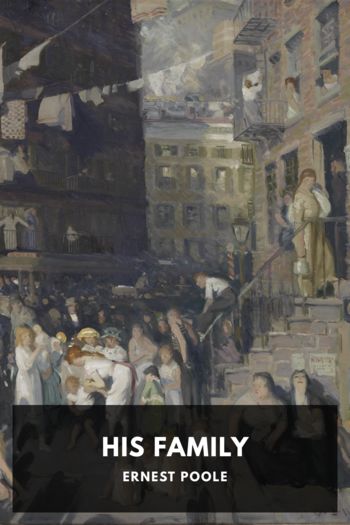His Family - Ernest Poole (ereader for comics .txt) 📗

- Author: Ernest Poole
Book online «His Family - Ernest Poole (ereader for comics .txt) 📗». Author Ernest Poole
“Allan tells me,” she said one day, when she was alone with her father, “that I can have no more children. And I’m glad of that. But at least I have one,” she added, “and he has already made me feel like a different woman than before. I feel sometimes as though I’d come a million miles along in life. And yet again it feels so close, all that I left back there in school. Because I’m so much closer now—to every mother and every child. At last I’m one of the family.”
XLIIOf that greater family, one member had been in the house all through the month which had just gone by. But he had been so quiet, so carefully unobtrusive, that he had been scarcely noticed. Very early each morning, day after day, John had gone outside for his breakfast and thence to the office where he himself had handled the business as well as he could, only coming to Roger at night now and then with some matter he could not settle alone, but always stoutly declaring that he needed no other assistance.
“Don’t come, Mr. Gale,” he had urged. “You look worn out. You’ll be sick yourself if you ain’t careful. And anyhow, if you hang around you’ll be here whenever she wants you.”
Early in Deborah’s illness, John had offered to give up his room for the use of one of the nurses.
“That’s mighty thoughtful of you, Johnny,” Allan had responded. “But we’ve got plenty of room as it is. Just you stick around. We want you here.”
“All right, Doc. If there’s any little thing, you know—answering the phone at night or anything else that I can do—”
“Thank you, so; I’ll let you know. But in the meantime go to bed.”
From that day on, John had taken not only his breakfast but his supper, too, outside, and no one had noticed his absence. Coming in late, he had hobbled silently up to his room, stopping to listen at Deborah’s door. He had kept so completely out of the way, it was not till the baby was three weeks old, and past its second crisis, that Deborah thought to ask for John. When he came to her bed, she smiled up at him with the baby in her arms.
“I thought we’d see him together,” she said. John stood on his crutches staring down. And as Deborah watched him, all at once her look grew intent. “Johnny,” she said softly, “go over there, will you, and turn up the light, so we can see him better.”
And when this was done, though she still talked smilingly of the child, again and again she glanced up at John’s face, at the strange self-absorbed expression, stern and sad and wistful, there. When he had gone the tears came in her eyes. And Deborah sent for her husband.
The next day, at the office, John came into Roger’s room. Roger had been at work several days and they had already cleared up their affairs.
“Here’s something,” said John gruffly, “that I wish you’d put away somewhere.”
And he handed to his partner a small blue leather album, filled with the newspaper clippings dealing with Deborah’s illness. On the front page was one with her picture and a long record of her service to the children of New York.
“She wouldn’t want to see it now,” John continued awkwardly. “But I thought maybe later on the boy would like to have it. What do you think?” he inquired. Roger gave him a kindly glance.
“I think he will. It’s a fine thing to keep.” And he handed it back. “But I guess you’d better put it away, and give it to her later yourself.”
John shifted his weight on his crutches, so quickly that Roger looked up in alarm:
“Look here! You’re not well!” He saw now that the face of the cripple was white and the sweat was glistening on his brow. John gave a harsh little nervous laugh.
“Oh, it’s nothing much, partner,” he replied. “That’s another thing I wanted to tell you. I’ve had some queer pains lately—new ones!” He caught his breath.
“Why didn’t you tell me, you young fool?”
“You had your own troubles, didn’t you?” John spoke with difficulty. “But I’ll be all right, I guess! All I need is a few days off!”
Roger had pressed a button, and his stenographer came in.
“Call a taxi,” he said sharply. “And, John, you go right over there and lie down. I’m going to take you home at once!”
“I’ve got a better scheme,” said John, setting his determined jaws. The sweat was pouring down his cheeks. “It may be a week—but there’s just a chance it—may be a little worse than that! So I’ve got a room in a hospital! See? Be better all round!” He swayed forward.
“Johnny!” Roger caught him just in time, and the boy lay senseless in his arms.
At home, a few hours later, Allan came with another physician down from John’s small bedroom. He saw his colleague to the door and then came in to Roger.
“I’m afraid Johnny has come to the end.”
For a moment Roger stared at him.
“Has, eh,” he answered huskily. “You’re absolutely sure he has? There’s nothing—nothing on earth we can do?”
“Nothing more than we’re doing now.”
“He has fooled you fellows before, you know—”
“Not this time.”
“How long will it be?”
“Days or hours—I don’t know.”
“He mustn’t suffer!”
“I’ll see to that.” Roger rose and walked the floor.
“It was the last month did it, of course—”
“Yes—”
“I blame myself for





Comments (0)